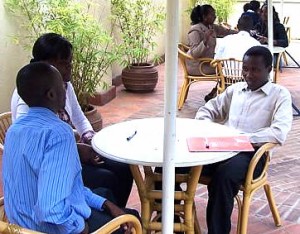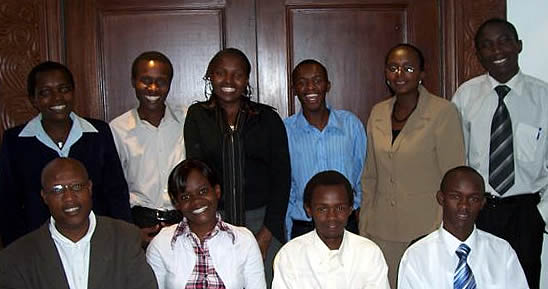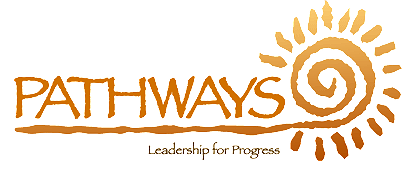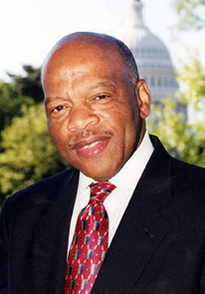Three new scholars– Nafisa Ayuka, Sara Simei and Kennedy Otieno– recently participated in an introductory program. The orientation was organized by first year scholars ,Monicah Wairimu and Isaac Ngere, with help from other scholars. Isaac presented on how to write a good proposal, highlighting contents such as background, rationale, methods, evaluation plan and conclusion.
Kaimenyi Visits Scholar’s Kabete Rehabilitation School Project
Catherine Kaimenyi, PATHWAYS student coordinator, visited Levis Maina’s Hand’s on Kenya volunteer project based at Kabete Rehabilitation School in Nairobi. This volunteer project was identified because the school is understaffed and these at-risk youth need mentoring and skill building to be able to go on to a productive adult life. Levis and his volunteers are filling a need by providing tutoring and study skill development as well as modeling volunteerism.
Kaimenyi Visits Scholar’s Youth Tutoring Project
Catherine Kaimenyi, PATHWAYS student coordinator and mentor, visited David Mundia’s project in the Karagocho slum area in Nairobi. David is from this area and encountered difficulties with finding a place to study when he was in school. Almost no houses have electricity so there is no light to study by and there is little privacy for concentration. Now as his PATHWAYS project, David has rented a nearby hall with electricity and provided tutoring to help children learn their school work in an environment conducive to studying.
2008 Conference, Heron Hotel, Nairobi Kenya
Our 2008 mid-year conference was delayed then cancelled due to the political turmoil that erupted after the 2007 presidential elections. Thankfully, all of our PATHWAYS scholars and their families survived the disturbances.
 We combined the mid-year conference and the annual conference by having an all day meeting with break out discussion sessions, presentations, and planning for the annual project proposals due May 30. Dr. Mbaabu Mathiu, our vice president in Kenya, and Deb Gust, President, were in attendance along with the PATHWAYS scholars.
We combined the mid-year conference and the annual conference by having an all day meeting with break out discussion sessions, presentations, and planning for the annual project proposals due May 30. Dr. Mbaabu Mathiu, our vice president in Kenya, and Deb Gust, President, were in attendance along with the PATHWAYS scholars.
One of the ideas put forth by Dr. Mathiu is the establishment of a common community project that would be worked on by all of the PATHWAYS scholars in addition to their individual community projects. The focus of the first project will be peace and reconciliation in the aftermath of the 2007 election turmoil and displacements. Other plans for the coming year include
- quarterly meetings focusing on capacity building and
- monthly postings to a group e-mail or blog regarding project progress and other relevant issues.
Because the PATHWAYS program is about empowering youth to become leaders, we asked the scholars to discuss several issues concerning the improvement of the PATHWAYS program in Kenya including ideas to better communicate to donors how their money is being used; ways to improve the cohesion of the scholars; and where PATHWAYS will be in five years. This activity allowed the scholars to discuss in small groups their ideas to improve PATHWAYS and outline its direction in the future.
One of the ideas they discussed is their own sponsoring of scholars when they graduate and obtain employment. This was deemed a good way of keeping scholars engaged in PATHWAYS and taking ownership of the future of the organization.
This year we gave out two awards: “Scholar of the Year 2007” and “Most Improved 2007”. We were happy to award Isaac Ngere the PATHWAYS Scholar of the Year 2007 award for his excellence in academics, his self sustaining orphanage community project development, and his assistance in implementing and expanding the PATHWAYS mission.
Lily Chepkorir received the PATHWAYS Most Improved 2007 award for her rapid progress in implementing and sustaining her bee hive and tree nursery projects in her community. Each came with a small monetary award.
The scholars’ presentations showed the thought and work they have put into their projects in addition to keeping up with their academic demands. The community projects require that the scholars work with 
other members of their communities and sometimes local politicians and officials to plan and carry out their ideas.





